Science summer research scholarships
Browse the current summer research scholarships on offer for students in the Faculty of Science.
Each year the Faculty of Science offers several exciting scholarships through the Summer Research Scholarship Scheme. These scholarships provide students with a unique opportunity to pursue an area of research they are passionate about.
To apply for a scholarship, get in touch with the supervisor directly.
Late Round Scholarships
Important application instructions for late round of Summer research scholarships:
- Before applying, please review the eligibility criteria and regulations to ensure you meet the necessary requirements. Please note that the Summer Research Scholarship for the late round can be awarded to eligible students enrolled at Waipapa Taumata Rau, University of Auckland only.
- Note that applicants should only apply for one project that best aligns with their interests.
- To apply, click the "Apply" button for the project you are interested in, which will direct you to send an email to the respective supervisor. Please attach both your CV and a copy of your academic transcripts.
- In the subject line of your email, clearly state the project number and title. In the body, include a brief introduction and explain why you are interested in the project.
- If your application is suitable, the respective supervisor will contact you directly by 30 October 2025.
- The application deadline is close of business on 22 October 2025. Applications received after this date will not be considered.
- For the late round, the Scholarship Office wil enrol students directly in SUMRESCH 301, so students do not need to apply separately for admission to the Summer Research Scholarship Programme.
- Please note that this round is limited to domestic students due to the time required for the Scholarships Office to confirm eligibility for international students.
SCI031 - Allosteric modulators of cannabinoid and opioid GPCRs
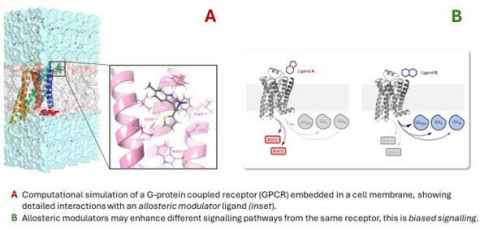
G-protein coupled receptors (GPCRs) are integral membrane bound proteins (A) that detect external stimuli and activate cellular signalling pathways. Important examples include sight (rhodopsin GPCR) and analgesia (mu opioid GPCR). A large percentage of current drugs target GPCRs, making them central to the discovery of next generation therapeutics.
This project focuses on the design, synthesis and evaluation of new allosteric modulators for the cannabinoid and opioid GPCRs (CB1 and MOR). These ligands bind away from the active site, allowing for the preservation of normal timing and distribution of cell signalling, leading to novel drugs with higher selectivity, reduced side effects and unique cell signalling profiles (B).
The ideal student would be keen to develop their skills in organic synthesis and drug design. Students with skills or interest in pharmacology and molecular modelling are also encouraged to get in touch, to discuss project branches emphasizing those areas.
Supervisor:
Dan Furkert
School of Chemical Sciences
SCI032 - New reaction discovery, in cycloaddition-promoted rearrangement chemistry
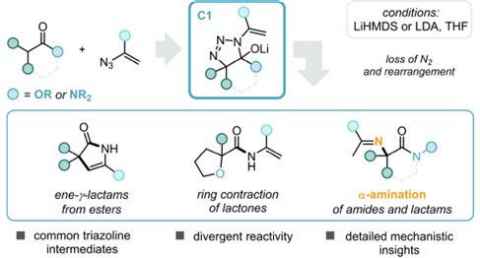
We have shown in our group that enolates and azides undergo facile (3+2) cycloaddition reactions, followed by rearrangement to give a wide variety of useful molecular scaffolds (see Figure) from simple starting materials.
This project focuses on the evaluation of new substrate types, to further probe the possibilities of the reaction manifold for generation of different product architectures. Many of the products available through this chemistry are of high potential value in drug discovery and natural product synthesis, and would be difficult to access in other ways. Some examples of applications in natural product or drug synthesis will also be pursued.
The ideal student would be keen to develop their skills and theory in organic synthesis and reaction design. Students with skills or interest in molecular modelling are also encouraged to get in touch, to discuss project branches emphasizing those areas.
Supervisor:
Dan Furkert
School of Chemical Sciences
SCI078 - Pollen characterization by spectroscopic techniques
This project aims to characterize pollen carried by honeybees using spectroscopic techniques such as FTIR, Raman, etc. Good teamwork is required, and some basic knowledge of spectroscopy is preferable.
Supervisor:
Francesco Merola
Department of Physics
SCI147 - Development of music perception in infants
This project asks what infants understand about sounds they hear, such as speech and music, by measuring eye movements, heart rate, and electrodermal in the laboratory with babies and parents.
Students will gain experience in a developmental science lab, including recruitment, data collection, and data processing. Experience with infants/children is helpful but not required.
Supervisor:
Samuel Mehr
School of Psychology
If you are interested in working on this project, email Dr Mehr to request a meeting. Only approved candidates can be considered for this role.
SCI201 - Investigating the environmental DNA isolation Using conductive polymers
This project investigates how different dopants in conductive polymers affect the capture and release of environmental DNA (eDNA). Building on preliminary findings, the student will synthesise polymers with various dopants and assess their performance.
The work includes hands-on experience with material synthesis, DNA handling, and characterisation techniques such as SEM, EDS, Raman, FTIR, and water contact angle measurements. The project is ideal for a summer student interested in materials science and environmental applications of polymer-based systems.
Supervisors:
Lisa Pilkington, Alireza Akbarinejad
School of Chemical Sciences
SCI202 - Investigating the role of electrolytes in electrochemical eDNA capture and release
This project explores how different electrolytes affect the efficiency of environmental DNA (eDNA) capture and release from conductive polymers using electrical stimulation. The student will test various electrolytes and evaluate their impact on DNA binding and release. The project also aims to investigate the mechanisms behind these effects.
Students will gain hands-on experience in electrochemical techniques, DNA analysis, and basic materials characterisation. It is ideal for those interested in materials science, surface chemistry, and environmental applications.
Supervisors:
Lisa Pilkington, Alireza Akbarinejad
School of Chemical Sciences
SCI203 - Enhancing eDNA capture efficiency using conductive polymer hydrogels
This project aims to improve environmental DNA (eDNA) capture efficiency by applying a conductive polymer-loaded hydrogel layer onto carbon cloth substrates. The hydrogel is expected to increase the available surface area for DNA binding, addressing limitations observed with the current system.
The student will focus on hydrogel fabrication, polymer integration, and evaluating electrochemical DNA capture performance. The project provides hands-on experience in materials development, surface engineering, and basic material characterisation techniques such as SEM, EDS, and mechanical testing.
Supervisors:
Lisa Pilkington, Alireza Akbarinejad
School of Chemical Sciences
SCI204 - Synthetic studies towards antimicrobial natural products
This project requires training in synthetic organic chemistry. Completion of undergraduate courses in biological/organic/medicinal chemistry is required.
Supervisor:
Distinguished Professor Margaret Brimble
School of Chemical Sciences
SCI205 - A molecular machine-based approach to artificial photosynthesis
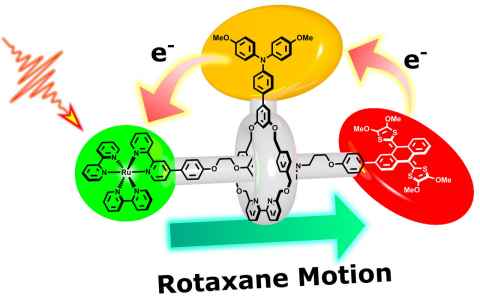
In this Marsden-funded project, we are investigating new paradigms to transport charge at the molecular scale using the dynamic nature of supramolecular architectures known as molecular machines. In doing so, we seek to overcome current limitations in biomimetic artificial photosynthesis and successfully mimic key steps of natural photosynthesis.
Students will synthesise key components of these molecular machines and characterise them using NMR, mass spec, UV-Vis and electrochemistry.
Supervisor:
SCI206 - Exploring students’ beliefs about setbacks and failure
This project will use mixed method approach to analyse qualitative data in which children discuss what makes a good teacher and school and how they manage setbacks. The features of the conversation and the children’s verbal responses will be explored against longitudinal resilience related outcomes.
Supervisor:
Elizabeth Peterson
School of Psychology
SCI207 - Regional blue economy development in Aotearoa New Zealand
Identifying current initiatives in blue economy development in Aotearoa and the corporate and other agencies involved in those initiatives at a regional scale. The material will be used to support the publication of an academic paper of regional economic development in Aotearoa’s blue economy.
The project will also include building a database of use and meanings of the term ‘blue economy’ in the New Zealand context, with a special focus on the Hauraki Gulf.
The project will require internet data searching skills and a knowledge of regional economic development issues. The project will begin at the end of UoA Semester 2.
Supervisor:
Nicolas Lewis
School of Environment
SCI208 - Marine restoration economy in the Hauraki Gulf
Documenting and categorising the nature and extent of marine ecological restoration activity in the Hauraki Gulf, the agencies involved, and the funding
arrangements for each project. This will support a paper on restoration economy in the Hauraki Gulf.
The candidate will ideally have a background in restoration economy. The project will begin immediately at the end of UoA Semester 2 exams.
Supervisor:
Nicolas Lewis
School of Environment
SCI209 - Global management consultancies at work in New Zealand Universities
Documenting, collating, and analysing the nature and extent of external management consultancy involvement in New Zealand’s university sector.
Material will need to be derived from diverse sources, collated, and categorised. The data will be used to support a publication outlining the influence of consultancies in university reorganisation in New Zealand since 2005. The project will also involve a literature review to support this publication. Candidates will ideally have skills in thematic and critical discourse analysis.
Timeline – starting as soon as possible following Semester 2 exams.
Supervisor:
Nicolas Lewis
School of Environment
SCI210 - Investigating dynamics near heteroclinic networks
Heteroclinic networks are dynamical objects which frequently occur in models of population dynamics or coupled oscillators, and are associated with intermittent behaviour and switching between various states. The switching can be periodic or aperiodic, and a variety of interesting patterns have been observed.
In this project, the student will investigate the dynamics near heteroclinic networks using a variety of analytical and computational techniques.
Supervisor:
Claire Postlethwaite
Department of Mathematics
SCI211 - Chemical Design of linkers to enable dual-payload antibody–drug conjugate
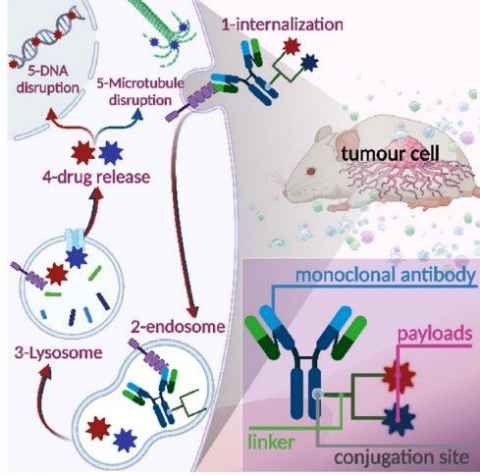
Antibody–drug conjugates (ADCs) are an emerging class of targeted cancer therapeutics that combine the specificity of antibodies with the potency of cytotoxic drugs. However, most ADCs are limited to carrying a single payload, restricting therapeutic potential and contributing to drug resistance.
This project aims to design and synthesise innovative chemical linkers that enable the conjugation of two distinct payloads to a single antibody. By combining drugs with complementary mechanisms of action, dual-payload ADCs have the potential to improve efficacy, overcome resistance, and reduce off-target toxicity.
The project will provide training in medicinal chemistry and bioconjugation techniques. Familiarity with organic and medicinal chemistry is desirable.
Supervisor:
Iman Kavianinia
School of Biological Sciences
SCI212 - Improving methods for understanding mycorrhizal symbioses of New Zealand conifers
Arbuscular mycorrhizae form beneficial symbioses with many plants providing improved nutrition, stress tolerance and disease resilience. Determining the characteristics and function of mycorrhizal symbioses with New Zealand conifers, however, has been difficult to achieve because of methodological challenges in measuring mycorrhizal colonization rates in seedlings, and unreliable inoculation techniques for focal mycorrhizal species into seedlings.
This project will refine and/or develop methods to measure mycorrhizal colonization rates within New Zealand conifer seedlings, particularly comparing nursery-raised versus wild seedlings. We will also try several different inoculation techniques (e.g., using isolated mycorrhizal spores, transfer from roots collected from wild adults) to achieve reliable mycorrhizal colonization of seedlings that can then be used for further experimentation.
Supervisors:
Bruce Burns, Maj Padamsee
School of Biological Sciences
SCI213 - Modelling networks with Hawkesian arrival times
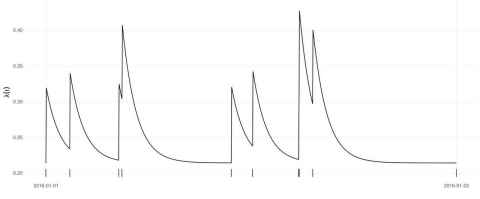
ThiS work is part of a Marsden-funded project that develops new ways to understand how events influence (or excite) one another over time. The successful candidate will work closely with the supervision team to create methods for estimating self-exciting point process models where events take place within a social network. The main focus is on modelling dynamic network growth in continuous time using non-linear Hawkes models.
Applicants should have solid computational skills (especially in R) and a
good grounding in statistical theory.
Supervisors:
Charlotte Jones-Todd
Conor Kresin (Otago)
Department of Statistics
SCI214 - Investigating skilful high resolution climate forecasts over Aotearoa New Zealand
This project will investigate how ocean conditions around Aotearoa New Zealand affect forecasts of atmospheric conditions such as temperature and precipitation at high spatial resolution.
Earth Sciences New Zealand (formerly NIWA) have recently performed a suite of high-resolution climate change simulations for Aotearoa NZ. We will identify states of oceanic variability within the simulations that match variability that has occurred historically, and then compare the corresponding atmospheric variables at high resolution to examine if the conditions from the simulations result in realistic atmospheric forecasts.
The student should have a background in physics or environmental science, and experience in python programming.
Supervisors:
Emily Gordon
Department of Physics
SCI215 - Enhancing access to Māori data sovereignty at Waipapa Taumata Rau; Preparing a policy guideline
Māori data sovereignty refers to the rights have to data that relates to Māori, and how it is designed, collected, accessed, interpreted, protected, and used.
Currently, there is a need to upskill the staffing and student body at Waipapa Taumata Rau. This scholarship provides an opportunity for a student to engage with collated Māori data sovereignty resource accessible to staff and students active in research. The student will have the opportunity to prepare a policy guideline in relation to Māori Data Sovereignty.
Applicants should have interest in Māori data sovereignty and a willingness to learn skills in data organisation and Policy guide writing.
Supervisor:
Hineatua Parkinson
School of Psychology